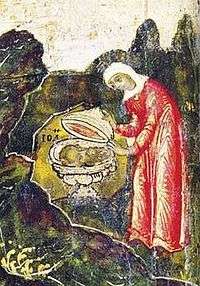Joanna, wife of Chuza
Joanna (Greek: Ἰωάννα γυνὴ Χουζᾶ or Ἰωάνα [1]) is a woman mentioned in the gospels who was healed by Jesus and later supported him and his disciples in their travels, one of the women recorded in the Gospel of Luke as accompanying Jesus and the twelve and a witness to Jesus' resurrection. She was the wife of Chuza, who managed the household of Herod Antipas, the ruler of Galilee. Her name means "Yahweh has been gracious",[2] a variation of the name "Anna" which means "grace" or "favour”.
Joanna | |
|---|---|
 Joanna and the Head of Saint John the Baptist | |
| Myrrhbearer | |
| Venerated in | Eastern Christianity Roman Catholicism Anglicanism Lutheranism |
| Canonized | Pre-congregation |
| Feast | 3rd Sunday of Pascha (Orthodox and Eastern Catholic) May 24 (Roman Catholic) August 3 (Lutheran) |
She is recognised as a saint in the Anglican, Eastern Orthodox, and Roman Catholic traditions.
Joanna as one of Luke's witnesses
Joanna is shown as the wife of Chuza, steward to Herod Antipas while being listed as one of the women who "had been cured of evil spirits and infirmities" who accompanied Jesus and the Apostles, and "provided for Him from their substance" in Luke 8:2–3. Theologian Adrian Hastings suggested that she could have been one of Luke's sources for information regarding the Herodian court.[3] As the wife of an important court official, she would have had sufficient means needed to travel and contribute to the support of Jesus and the disciples.
Joanna is named among the women mentioned in Luke 24:10, who, along with Mary Magdalene and Mary, the mother of James, took spices to Jesus' tomb and found the stone rolled away and the tomb empty. The accounts in the other synoptic gospels do not mention Joanna as one of the group of women who observe Jesus' burial and testify to his Resurrection.
Myrrhbearer
In Orthodox tradition, she is honored as Saint Joanna the Myrrhbearer (Greek Αγία Ιωάννα η Μυροφόρος) and is commemorated among the eight women who carried myrrh on the "Sunday of the Myrrhbearers", two Sundays after Pascha (Orthodox Easter). From this commemoration, in the revised Calendar of Saints of the Lutheran Church–Missouri Synod she is commemorated as one of Myrrhbearers on August 3 together with Mary, the Mother of James the less and Jude and Salome.[4]
Although not mentioned by name, Joanna is most likely counted as one of the women who joined the disciples and Mary, the mother of the Lord, in the upper room in prayer. She was among the group of 120 who chose Matthias to fill the vacancy that was left by Judas, as well as being present on the Day of Pentecost.[5]
Identification with Junia
Both Richard J. Bauckham and Ben Witherington III conclude that the disciple Joanna is the same woman as the Christian Junia mentioned by Paul in his Epistle to the Romans (Romans 16:7). Most early Greek manuscripts list the name Junia as feminine, with the consensus of New Testament scholarship agreeing that Junia was a woman.[6]
While this is possible, in Romans 16:7 Junia is mentioned along with Andronicus so they may be a husband and wife team like Priscilla and Aquila.[7] If that is the case, it would be unlikely that "Junia" is another name for Joanna since Joanna's husband, according to Luke 8:3, was Chuza. Though given her freedom to follow Jesus, she may well have been widowed and this was a subsequent marriage.
Joanna granddaughter of Theophilus
An ossuary has been discovered bearing the inscription, "Johanna, granddaughter of Theophilus, the High Priest."[8]
In popular culture
- In the 2015 television miniseries Killing Jesus Rotem Zissman-Cohen plays Joanna.[9]
- In the 2015 television miniseries A.D. The Bible Continues, Joanna is portrayed by Farzana Dua Elahe.[9]
Notes
- Luke 24:10: Westcott and Hort, The New Testament in the Original Greek/Nestle-Aland Novum Testamentum Graece, 27th edition variants, accessed 9 February 2017
- Douglas, J. D. and Tenney, Merrill C., Zondervan Illustrated Bible Dictionary (2011), p. 742. ISBN 0310229839
- Hastings, Adrian. Prophet and witness in Jerusalem: a study of the teaching of St. Luke, (London; New York: Longmans, Green, 1958), p.38
- Philip H. Pfatteicher New Book of Festivals and Commemorations. Page 376. 2008.
- "Joanna", Coptic Orthodox Diocese of the Southern United States
- Al Wolters, "IOUNIAN (Romans 16:7) and the Hebrew name Yĕḥunnī," JBL 127 (2008), 397.
- Moo, Douglas, J. The Epistle to the Romans, (Grand Rapids, Michigan; Cambridge, UK: William B. Eerdmans, 1996), p. 923
- D. Barag and D. Flusser, The Ossuary of Yehohanah Granddaughter of the High Priest Theophilus, Israel Exploration Journal, 36 (1986), 39–44.
- Peter Chattaway. "Joanna gets a speaking role in Killing Jesus and A.D.", Patheos, March 19, 2015
Further reading
References
- Bauckham, Richard J., Gospel Women (Grand Rapids, Mich.: Eerdmans, 2002), pp. 109–202.
- Witherington, Ben, III, "Joanna: Apostle of the Lord — or Jailbait?", Bible Review, Spring 2005, pp. 12–14+